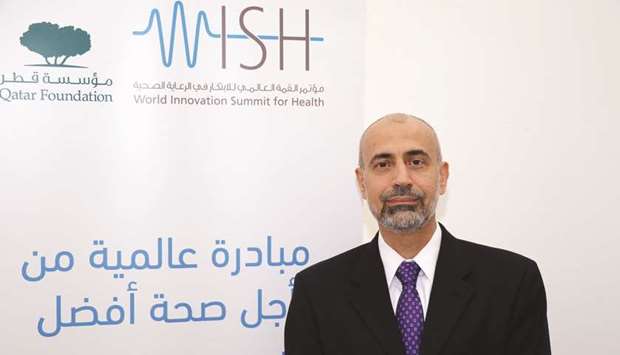* WISH 2020 begins Sunday virtually
* Report to provide possible pathways for diagnosis, treatment and drug development for several diseases
A white paper on precision medicine by Economist Intelligence Unit on various pathways of diagnosis, treatment and drugs development and sponsored by Qatar Foundation (QF) will be launched Sunday during the World Innovation Summit for Health (WISH) 2020, Gulf Times has learnt.
The biennial WISH summit, which is being held virtually this year, begins Sunday with the participation of a large number of global healthcare experts and lasting until November 19.
“The report looks at the promise of precision medicine, what it is currently delivering and challenges associated with its wider application in large health systems. The key findings of the report provide new pathways for treatment and drugs development with potential outcomes using four interwoven, data-related enablers,” said Dr M Walid Qoronfleh, director of Research & Policy, WISH, QF’s global healthcare initiative.
Dr Qoronfleh, who was one of the international healthcare experts who provided a professional perspective to the report, explained: “The four enablers are the large volume of data available to health systems, the vast growth in the kinds of data for health systems, the increasing popularity of data storage systems, permitting easier access to relevant information, and the quantum leaps in analytic technology to get greater insights out of this information. All these provide greater ability to understand the bodies of individual humans in finer details and provide solutions using precision medicine taking into account the common characteristics.”
According to Dr Qoronfleh, “Precision medicine, or personalised medicine as it is known in some parts of the world, is healthcare customisation or tailoring, healthcare delivery in a distinctly and well-defined patient-centric way. It is a holistic approach to be more precise, predictive and personalised leading to 'better care, better value, better health and better social outcomes'."
The healthcare expert noted that precision medicine has the potential to transform the diagnosis and treatment of several diseases in a big way, especially various types of cancers.
“The biggest advances in precision medicine are made in cancer, rare diseases and pharmacogenomics using genomic data to indicate how a given drug will affect an individual. For cancer, in 2018 and 2019 the US Food and Drug Administration approved 103 new molecular entities, 36 of which could be described as personalised medicines. Of these, 14 are for some form of cancer. Key advances have been in biomarkers for diagnosis and immunotherapy,” he pointed out.
“Precision medicine is expected to improve healthcare in a number of different ways at the patient, health system and population health levels. At patient level, the medical approach is more precise, predictive and personalised such as avoiding harm by protecting patients from adverse effects of therapies. At the healthcare system level, evidence-based research, cost-effectiveness and efficiency and better decisions lead to better patient outcome, while at the population level it can be incorporated into health strategies or national policies, leading to improved healthcare promotion, prevention, surveillance and public health management,” the official said.
However, he admitted that there are certain key challenges for precision medicine to be integrated into public healthcare systems.
“These include factors that are societal in nature, such as creating an appropriate regulatory, ethical and suitable cultural framework for precision medicine as well as enhancing precision medicine awareness, community engagement and applicable education programmes. Health system-related challenges include securing stakeholder commitments, proving value and building the necessary infrastructure. Other challenge are scalability and integration issues such as sustainable resources, developing a workforce capable of precision medicine, relevant expertise, training and incorporation into primary care,” he said.
Dr Qoronfleh also stressed that patient centricity is key to precision medicine's implementation and success.
“Rather than viewing patients as objects of solicitous care, or even as empowered consumers, they are seen as full and active partners with clinicians. This partnership includes decision-making about an individual’s treatment and the co-creation of health research activities and patient input into the management of healthcare systems. That is 'a conversation of equals'," he emphasised.
The expert added that precision medicine tools are playing a key role in the fight against Covid-19 by involving the genomics of the pathogen as well as searching for a vaccine.


